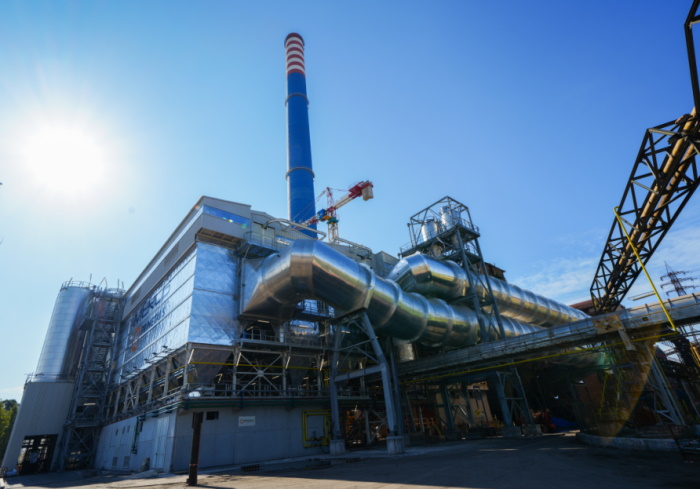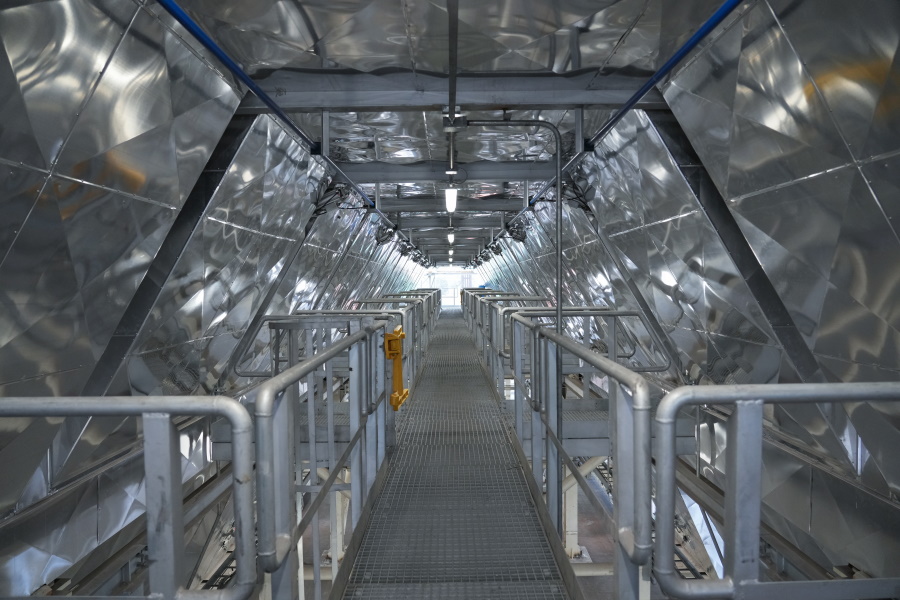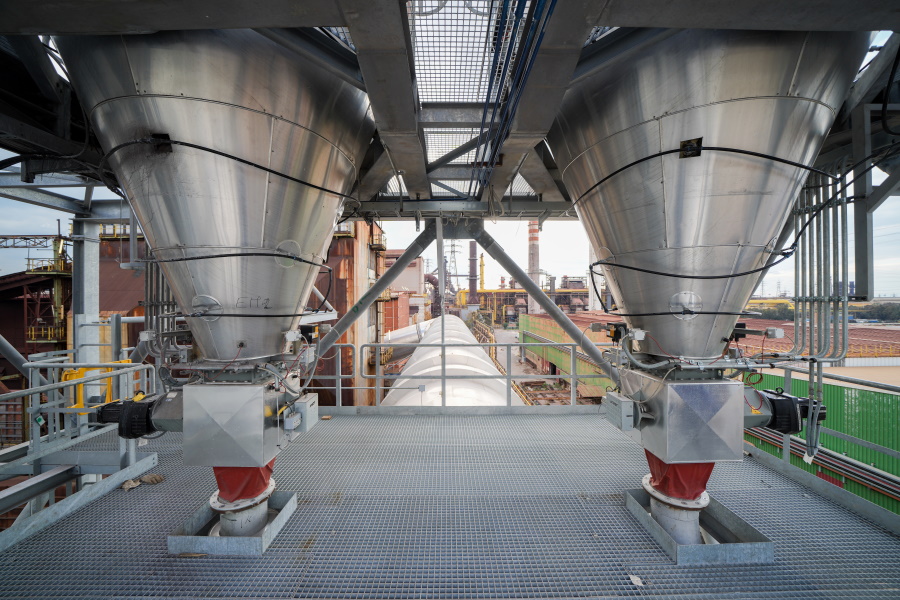24/03/2022
Acciaierie d’Italia and Primetals Technologies completed the realization of a top-class installation in the Taranto Plant. Alexander Fleischanderl, CTO Upstream & Head of ECO Solutions, describes the enormous scope of this partnership: “Primetals Technologies is spearheading the decarbonization of the steel sector and is looking to partner with producers to realize even greener metals production. Acciaierie d’Italia’s mid-term plans align nicely with our own, and we hope that we will continue to join forces and deliver great results”.
The first meeting between Acciaierie d’Italia and Primetals Technologies took place in 1999. As Fleischanderl recalls, “I was a young engineer when I lead the first project of my company in Taranto. Twenty years later we opened a new chapter in our partnership, when Acciaierie d’Italia ordered four MEROS lines for agglomeration plants D & E in 2019. The first two MEROS systems for line E were recently taken into operation and are delivering excellent results”.

MEROS filters are designed to reduce emissions from sinter plants, down to levels never before achieved: “MEROS is a modular high-end gas-cleaning system that removes almost all harmful components present in the waste gas at extremely high removal rates. Just to name SOx, NOx, dust (PM10, PM2.5), dioxin/furans (PAH – polyaromatic hydrocarbons), other organic compounds, heavy metals like lead or mercury and acidic gases like hydrochloric or hydrofluoric acid)”, continues Fleischanderl. “At Acciaierie d’Italia, the key focus has been dust (<5 mg/Nm³), SOx (up to -99%) and dioxin (<0,1 ng/Nm³ TEQ). I am excited to report that we have achieved emission-removal rates lower ever before, far below the legal limit. We are proud of these achievements and our contribution to the air quality in Taranto and in the Puglia region, which the local population is of course benefitting from”.
The technology, first conceived in 2004, already demonstrated its effectiveness in many previous installations all around the world, but has now reached the final stage of evolution: “The MEROS technology was developed in 2004, and was first implemented on a commercial scale in 2007 at the site of voestalpine in Linz, Austria. This plant was also the first in Europe in the steel sector that was equipped with SCR-DeNOx technology. It is worth mentioning that the DeNOx part was executed in collaboration with Yara, who we are also partnering with for the CET#2 project. In August this year, MEROS will celebrate its 15-year anniversary and the voestalpine MEROS system is still working reliably and with consistently good performance”.
MEROS effectively reduces emissions and, at the same time, improves operational efficiency without compromising production needs. It is a highly efficient dry-type gas cleaning process based on a combination of processes: injection and fine distribution of adsorption and desulfurizing agents, such as activated carbon and sodium bicarbonate, into the waste gas, and efficient filtering of the waste gas by means of a pulse jet fabric filter. “The efficient way for the additive injection and the recirculation of the separated dust again and again to minimize the additive consumption and finally resulting in minimum by-product is another crucial feature. MEROS offers the opportunity to treat this by-product via a unique leaching process that lowers the amount of waste product going to landfill by about 90%, while most of it is recycled back to the sinter feed”, underlines Fleischanderl. “The small remaining fraction concentrates all harmful compounds. The high-performance fabric filter is another feature. Due to the recirculation the dust concentration in the waste gas is around 10.000 mg/Nm³ and after the filter less than 5 mg/Nm³, which requires an efficiency exceeding 99.95%. The special type of filter bag material combined with low cleaning pulse pressure usually results in very long component lifetime”.
A demanding project completed in less than two years in a very challenging scenario: “I think we can be proud of our commitment to complete the project within a very ambitious time frame. I’d like to mention three main challenges: meeting the extremely short execution schedule, impacted by the main period of the pandemic; executing the dismantling and construction work in a relatively narrow space while keeping the agglomeration plants and the old gas-cleaning systems fully operational for the entire span of the works. Also, the short shut-down times to re-connect to the new MEROS gas-cleaning required meticulous planning,” explains Paradiso, head of the branch office, “but we took advantage of the modular design concept of the filters, which allows for a very high level of customization, and from the sound collaboration with Acciaierie d’Italia and all contractors”.
Everyone involved in the project is particularly satisfied with the fact that is was executed almost entirely by partnering with local companies from the province of Taranto and Puglia Region, reaffirming the tight relationship between the plant and the territory. “Primetals Technologies has an on-site branch office at the Taranto plant, represented by Ing. Vitantonio Paradiso and Dr. Maria Fedele, which is responsible for the entire Italian market but, because of its location, has particularly close ties with Acciaierie d’Italia. This setup allows us to coordinate local suppliers and construction companies, and to collaborate with our international teams to make it easier for Primetals Technologies to stay in continuous and close contact with Acciaierie d’Italia. I believe it may have been the most important factor in successfully establishing this outstanding partnership” says Fleischanderl.


The partnership between Acciaierie d’Italia and Primetals Technologies will continue in the coming years both for the conclusion of the MEROS installation on sinter line D and for new projects currently at the design phase: “In 2021, Primetals Technologies – with its consortium partner Yara – was also selected to install three MEROS plants including new economizer and SCR-DeNOx systems at all three monoblocs in power plant #2. Primetals Technologies is responsible for the dedusting and desulfurization of the waste gases from the three boiler blocks. This will bring the total of MEROS filters in the Taranto plant to the remarkable figure of seven: operating them at once will lead to decisive advantages for Acciaierie d’Italia because of synergy effects in terms of spare part management but also operation and maintenance”. Both projects are scheduled to become operational by 2023.
“We trust that our long-lasting good partnership will continue, and we are already enthusiastically discussing new and upcoming projects for a further modernization of the upstream and downstream areas”, concludes Fleischanderl.